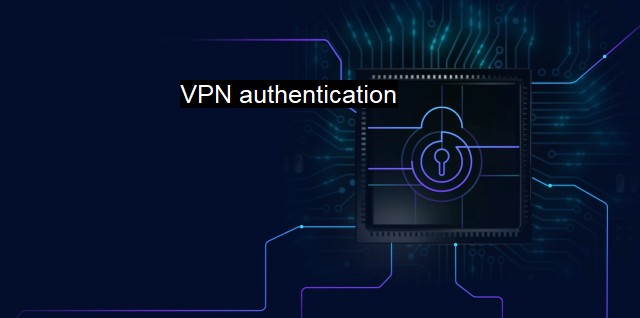What is VPN authentication?
The Importance of VPN Encryption and Authentication: Protecting Sensitive Data and Securing Internet Access
VPN authentication is an integral component of establishing a Virtual Private Network (VPN) connection. This critical security procedure helps maintain network integrity by ensuring that unauthorized individuals can't gain access to sensitive resources, including networks and databases. Given the essential role VPNs play in cybersecurity and antivirus programs, understanding VPN authentication will provide essential insights into protecting data.VPN authentication is the identity confirmation process that a VPN client and server undertake before establishing a connection. In other words, it is akin to a security checkpoint that a user must pass before given access to a VPN tunnel. If the user's credentials match the server-side information, they gain clearance to connect to the network. this procedure is aimed at curbing unauthorized network access by securing the network at a basic authentication level.
Operatively, a typical VPN authentication process revolves around two critical components: the username and password. These two parameters allow the server and client devices to verify each other. The server establishes that the client is a trusted device with permission to access the server's secured resources before the connection is approved.
The basic two-factor authentication procedure isn't the only method to authenticate a VPN client. For more robust security, it should be backed by additional features such as a one-time password (OTP), security keys, or biometric authentication methods. More sophisticated VPN authentication protocols employ multi-factor authentication (MFA) for added security. MFA involves the use of at least two independent ways to confirm the user's identity. This, in turn, raises the security bar to detect and prevent unauthorized access.
VPN authentication becomes highly significant. VPN establishes a secure tunnel between two points on a network, most notably in commercial setups where remote access to a corporate server is required. Cyber threats can manipulate vulnerable loopholes to gain unauthorized access to sensitive data. In this regard, VPN authentication minimizes such risks by ensuring that only devices with appropriate authorization gain access.
Given the vast scope of cybersecurity threats, VPN authentication becomes absolutely essential when it comes to antivirus measures. Malware and other harmful programs often seek weak points to compromise systems. A robust VPN authentication system will effectively nullify any attempts at overriding VPN connections to install malicious software or viruses.
Considering techniques used by cybercriminals are constantly evolving so rapidly, it becomes quite challenging to protect the network entry and exit points. The protection offered by a solid VPN authentication process is, therefore, an indispensable part of any cybersecurity strategy meant at countering the growing threats.
A stronger VPN authentication mechanism offers more robust security against cyber threats such as hacking, espionage, and data theft, just to mention a few. Advanced methods involving biometrics and security token permissions work in unison with traditional username-password modalities for a robust authentication platform.
Applying VPN authentication also plays a significant role in strengthening one's antivirus security measures. VPN enhances the antivirus software's capabilities by providing an additional security layer to the protocol suites. For instance, some VPNs can keep a check on all the data that runs through their servers for malware or viruses. They can effectively weed out potential threats before they penetrate the network and cause harm thereby boosting existing antivirus mechanisms.
VPN authentication is an essential pillar in the cybersecurity framework. It represents a frontline defense barrier ensuring that access to a VPN is restricted to authorized users only. Given the rapid evolution of cyber threats, it calls for sophisticated, multi-layered VPN authentication strategies for improving cybersecurity protocols including antivirus measures.

VPN authentication FAQs
What is VPN authentication?
VPN authentication is the process of verifying the identity of the user before granting access to a VPN network. It ensures that only authorized users can connect to the network and access the data.Why is VPN authentication important for cybersecurity?
VPN authentication is crucial for cybersecurity because it prevents unauthorized access and protects sensitive data from cyber threats. It reduces the risk of cyber attacks and data breaches by ensuring that only authenticated users can access the network.What are the different types of VPN authentication?
The most common types of VPN authentication include username and password, digital certificates, and two-factor authentication. Usernames and passwords are the most basic form of authentication, while digital certificates and two-factor authentication provide a higher level of security.How does VPN authentication work with antivirus software?
VPN authentication works with antivirus software to provide an additional layer of security. Antivirus software detects and blocks malicious software, while VPN authentication ensures that only authenticated users can access the network. The combination of VPN authentication and antivirus software helps to prevent cyber attacks, data breaches, and other security threats.| | A | | | B | | | C | | | D | | | E | | | F | | | G | | | H | | | I | | | J | | | K | | | L | | | M | |
| | N | | | O | | | P | | | Q | | | R | | | S | | | T | | | U | | | V | | | W | | | X | | | Y | | | Z | |
| | 1 | | | 2 | | | 3 | | | 4 | | | 7 | | | 8 | | |||||||